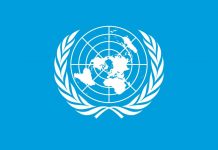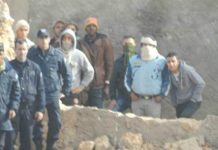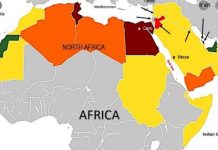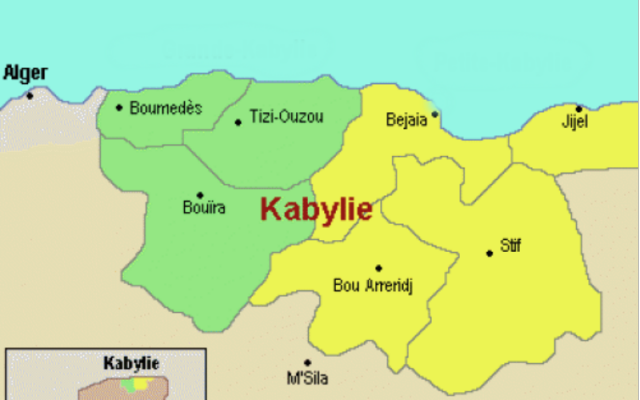We are the friends of liberty everywhere, the guardians only of our own: John Quincy Adams’s famous aphorism comes to mind as we observe the cruel realities of international affairs. It is a happy day in Kabylie—the large mountainous region east of Algiers that is home to Algeria’s biggest Berber minority—as its national movement unveils a new flag this weekend. But it is a bitter day, too, as the unveiling is taking place on the Place du Trocadéro in Paris, preferred site of exiled campaigns for human rights.
Campaigns by whom? Most often, by ethnic or tribal or religious or merely liberty-aspiring minorities who find in France, as Victor Hugo said, a second homeland. The great poet and lifelong freedom fighter—himself an exile from the tyrannical regime of the second Napoleon—scarcely could have foreseen the number of Africans today made homeless for the cause.
Kabylie was once a hotbed of the Algerian revolution. Now it seeks independence from the nation it led out of colonialism in a war against France. A perceived betrayal of the proclaimed goals of political freedom and liberty of conscience led, as soon as the French left, to a civil war that, in a sense, has never ceased. Witness the Berber Spring in 1980, a democratic revolt in ’88, more violence at the turn of the century, and finally a movement toward autonomy and outright independence by exasperated citizens whose patience wore out after years of contributing to the development of Algeria and joining others in the country in patriotic resistance to Islamic terror in the ’90s. Exiled in France, Kabyles dream of freedom at home while defending their former enemy against Islamists who refuse to conform to the rules of the host country.
There are solid reasons for the United States to pressure Algeria on Kabyle rights, not the least of which is the long tradition of Berber resistance to Arabo-Islamist fascism and the latter’s hostility to liberty throughout the Middle East and North Africa. This resistance has many roots, including the ancient, and quite marked, Jewish influence on Kabyle culture. If, prudently or not, we became seriously engaged in the long war for reform and liberal revolution in the Islamic world, then surely the fate of the minorities within that world whose perspectives are most akin to ours ought to be a concern.
And a weapon: Who is to say what might have happened had those who promoted U.S. intervention in neighboring Libya considered the Berbers of Libya an asset that could have been a force for good in that land?
We need Algeria and its renowned security services in our fight to block the jihadist assault on black Africa. It might be simpler to twist the arms of our trustworthy friends in Saudi Arabia and Qatar who have been funding mischief throughout the Muslim zones of Africa for decades. Ah well, so many complications—little wonder we always return to Adams. But, in their way, so do the Kabyles, an admirable people who, though few, never give up on the dream. Today, we salute them.

























I salute back, and set the record straight.
{{1.}} There are solid reasons for the United States to pressure Algeria on Kabyle rights, not the least of which is the long tradition of Berber resistance to Arabo-Islamist fascism and the latter’s hostility to liberty throughout the Middle East and North Africa.
– “solid reasons” – what can these be – for the algerian and other similar regimes, wouldn’t survie a day, without the american and similarly backwards regimes? I take it, I jsut have to decode your cues huh – resistance to arabo-islamism throughout “the middle-east” – whatever this notion of middle-east means in Africa.[nausea].
{{2.}} This resistance has many roots, including the ancient, and quite marked, Jewish influence on Kabyle culture.
– Let’s straighten another angle, shall we? – Yes Jews have settles in north-africa way way back, and in Kabylie the name for them is “Amravdhen” also known in french as ‘marabouts”. Yes they lived freely, but out of political affairs. The religious tricks are personal matters forbidden in the public space for centuries, in kabylie at least for centuries, until the arrival of the french in 1800s – when all nobodies and others social auxiliaries, found a new role and position – that of attache’s, ie “Marabouts” – to carry out French mission of “the greater french-islamic kingdom” from Rabat to Damascus. Cultural proximity and language translation, they facilitated, is the only role and influence, one anonymous salutor can attribute to the jewish passage, in my homeland, Kabylie. No wonder, thay have all left with France. Good ridence – the coran and other things they left behind shall follow… Those who succeeded in “neutrality” during the independance from france, are the only relays upon which the algerian regime relies in Kabylie today.
History remembers, that augustine is neither jewish or Italian, not from Rome’s ghetto, speaks louder…
Israelo-Palestinian stories, are {{NONE of our business}}. Defense of Liberty and Democracy in the western world, in the strictly geographical sense since there are no others, is the last trick we can swallow – we are not that golluble !